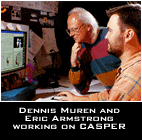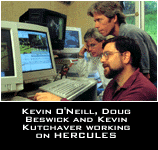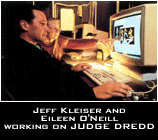Spotlight : March 1997
Photo Op
By Owen Hammer
Spotlight : March 1997
Photo Op
By Owen Hammer
I'm sure everybody at this site is familiar with the big-name special effects
supervisors. Probably you've all seen pictures of them. Few of these are sincere,
candid sanpshots, as they usually promote a multi-million dollar film, and are
subsequently the product of that film's PR apparatus. Cataloging all of the PR photos
of supervisors would be easy, as they all follow a basic theme.
I wonder if this the best they can do. 'They' being the PR dept. I'm not sure how
this became the canon, but I'd suspect that it started between 1989 and 1991, when the
concept of creating special effects on a computer was so radical, that a picture of a
special effects supervisor in front of a computer screen was equally radical. As a
photographer, you've made a statement. It's 1997 now, and a PR department wanting a
shot of the supervisor in front of a computer screen has all the punch of a freshman
guitar major wanting to do a new rendition of "Louie, Louie" for his final project.
Then, between 1989 and 1991 so-called entertainment news got a hold of a reasonably
entertaining story.
There were some shining moments at first. When JURASSIC PARK came out, the VNR/EPK
footage on the fluff shows (Entertainment Tonight, Hard Copy, and sadly the evening
news) was Dennis Muren et al at a zoo studying alligators and birds. The voiceover
(sometimes the voiceover provided with the tape, sometimes the show's own anchor)
succinctly explained the fact that, since there are no dinosaurs anymore, an
extrapolation has to be created based on currently existing animals.
How's this for a publicity photo for the FX team on THE LOST WORLD: the entire special
effect team, I mean every computer artist, every supervisor, all the additional
production personnel from the blue-screen shoots, all the researchers, all in one big
theatre, taken with a fish-eye lens? Far from the absurd two-guys-at-a-computer
scenario created by the publicity machine.
If you want an original shot, how about two artists up on a table seriously trying to
act like elephants in attempt to address an anatomy question.
How about a picture of the entire staff at ILM attending a special performance of
STOMP arranged by George Lucas? Whatever angle you want, you can find an interesting
story.
We're not talking about dull material here. There are so many interesting stories
behind the production of visual effects, isn't it ironic that they get such mediocre
treatment, especially in light of the sensationalist, over-blown coverage of the
actors and directors? I hope in the upcoming years PR departments, and the special
effects industry can break out of this formula.
Owen Hammer
 Actually, 'theme' is being
kind; they all have the same pose -- the supervisor is looking at a computer screen
along with the digital artist. The only variation on this theme is what side they're
on, and whether there's a third person involved in the shot. The third person is
invariably on the telephone. I'd assume that talking on the telephone is the second
most recognizable symbol of work in our culture, the first being sitting in front of a
computer screen.
Actually, 'theme' is being
kind; they all have the same pose -- the supervisor is looking at a computer screen
along with the digital artist. The only variation on this theme is what side they're
on, and whether there's a third person involved in the shot. The third person is
invariably on the telephone. I'd assume that talking on the telephone is the second
most recognizable symbol of work in our culture, the first being sitting in front of a
computer screen.
 In the eighties, the
supervisor would be constructing miniatures, supervising stop-motion photography in an
environment where one clumsy grip bumping into a light would ruin days of work. There
were no layers of anything. There were holdbacks -- the actual film running parallel
through the original analog printers. Putrid smelling chemicals and mathematical
guesswork that makes your pre-calculus story problems look like tic-tac-toe were the
day's docket.
In the eighties, the
supervisor would be constructing miniatures, supervising stop-motion photography in an
environment where one clumsy grip bumping into a light would ruin days of work. There
were no layers of anything. There were holdbacks -- the actual film running parallel
through the original analog printers. Putrid smelling chemicals and mathematical
guesswork that makes your pre-calculus story problems look like tic-tac-toe were the
day's docket.
"Yes you heard me right, Regis, we did it all on a computer."
"Computer? How'd you get liquid metal to look like that?
Where can our viewers purchase liquid metal?"
"No, it's all on the computer. These things did not exist in real-life."
"Computer? I own a computer! The tools for delivering extraordinary
things are now commonplace. It's a complete paradigm shift.
'Digital Hollywood' is on its way. Soon actors and directors will
be replaced by computer images."
"Well, actually I wouldn't go as far as . . ."
"The audience will interact with the characters in stories written
by our Klingon Overlords . . ."
 Interesting, informative,
and topical. Wow, it's almost news. At least it shows the artist in a flattering
light -- insightful, inquisitive, constantly seeking inspiration. This also happens
in the computer labs, but not in the sterile environment created by the
two-guys-at-a-computer mentality.
Interesting, informative,
and topical. Wow, it's almost news. At least it shows the artist in a flattering
light -- insightful, inquisitive, constantly seeking inspiration. This also happens
in the computer labs, but not in the sterile environment created by the
two-guys-at-a-computer mentality.
 I'd like to see the room at
ILM that houses the actual hard-drives. Compare it to a hard drive in a personal
computer, and you give the viewer a sense of perspective. Tell them how many pieces
of paper would be filled if all the data from the digitized film of a feature were
written on them. Enough to get to the moon? Probably.
I'd like to see the room at
ILM that houses the actual hard-drives. Compare it to a hard drive in a personal
computer, and you give the viewer a sense of perspective. Tell them how many pieces
of paper would be filled if all the data from the digitized film of a feature were
written on them. Enough to get to the moon? Probably.
Back to the Spotlight Main Menu

. . VFX HQ Produced by Todd Vaziri . . http://www.vfxhq.com . . e-mail: tvaziri@gmail.com . .
All text Copyright © 1998 Todd Vaziri, unless otherwise noted